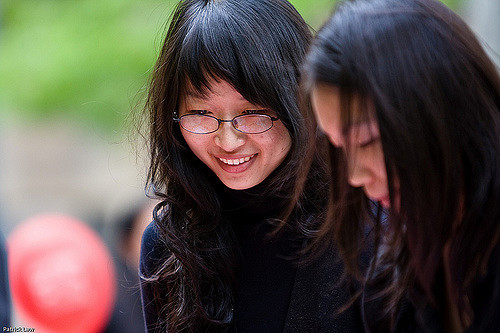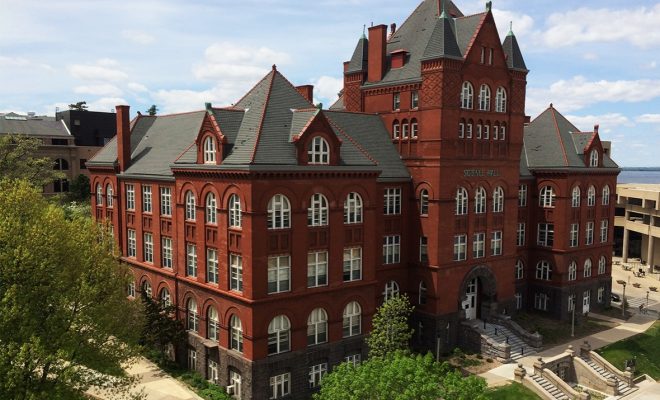2023 Best Online Bachelor’s in Social Science Programs

Click here to find out more about the ranking methodology that we used to compile this list.
Congratulations! If you represent a college or university that is included in this list, please collect your seal below.
Deciding which college to attend can be a daunting task. For many, it will be the most important decision that they make in their lives. To make an informed decision, you have to consider a lot of variables, such as cost of attendance, financial aid, student/teacher ratio, academics, student life, and more. These factors will either positively or negatively impact the quality of education that you receive.
Do you want to acquire a bachelor’s in social science, but don’t know what institution you should attend? Well, if you are as ambitious as I was in my late teens, then you want to attend a top school, instead of an average or mediocre one. Fortunately, we have already done the legwork for you. To help you find the right school for your interests and goals, we’ve compiled a list of 2022’s best bachelor’s in social science programs.
What institution did we forget? Leave your thoughts in the comment section below.
- University of Washington, Seattle, WA
Established in 1861, the University of Washington at Seattle (UW) has an online bachelor of arts in integrated social sciences that investigates how groups function in contemporary societies. With classes covering concepts such as comparative colonialism, Filipino histories, and anthropology of international health across seven potential thematic inquiry areas, learners culminate their studies in a capstone class synthesizing their studies for eventual publication in an e-portfolio.
UW’s 180-credit ISS degree program offers adaptable, asynchronous pacing that full-time learners can finish in one to two years. Part-time learners take three to four years. Along the way, learners can expect support from the ISS advising team, which aids learners in anything from creating learning plans for graduation, accessing the ISS librarian for research questions, or facilitating interactions with professors. The ISS team can help adjust learner objectives to ensure learning plans best reflect their objectives and interests for their academic and professional futures.
Candidates wishing to join the degree program must have finished the College Academic Distribution Requirements before acceptance, which consists of studies in English, mathematics, a maximum of second-year algebra, social sciences, world languages, lab sciences and the performing arts. Candidates must also have finished at least 75 transferable quarter credits from regionally sanctioned institutions or colleges, along with maintaining a 2.0 or higher GPA and demonstrating progress toward completing UW’s general education requirements. The University of Washington is sanctioned by the Northwest Commission on Colleges and Universities (NWCCU).
- University of Central Florida, Orlando, FL
The University of Central Florida (UCF) was established in 1963. The school has a bachelor of science in social science, which is an online degree program dedicated to the comprehension of the complexity of human interactions in academic and professional settings. With coursework that includes six potential minor concentrations, such as psychology, sociology, and communication, learners engage in a breadth of social science materials while building towards an exit exam taken during their graduating semester.
Learners leave the degree program with critical and analytical skills necessary for future professions.
Throughout UCF’s 120-credit degree program, learners can access an array of academic resources and supports provided for learners. Candidates must submit either a high school or a homeschool transcript along with either SAT scores or ACT with writing scores. If applicable, learners should also present official college transcripts from any previously attended colleges and furnish English proficiency exam scores if coming from a non-exempt international context. While not required, candidates should strongly consider submitting an application essay.
- New York University, New York, NY
Established in 1831, New York University (NYU) has a bachelor of arts in social sciences to impart basic comprehension of social science subjects. New York University is sanctioned by the Middle States Commission on Higher Education (MSCHE). Through classes such as business ethics, emotional intelligence, and gender issues in the workplace, learners build an academic foundation from which their studies culminate in one of two capstone options. Whether through an independent senior project or a senior internship in a real work setting, learners finish their studies by demonstrating a rich comprehension of social science principles.
NYU’s 128 to 130 credit degree program has several concentrations. Learners can investigate many options to fit their academic interests. For people who need financial support, NYU offers resources and supports for finding appropriate scholarships to reduce the degree program’s financial strains.
Candidates need either an associate degree or an equivalent of 60 transferable college credits with a recommended minimum 3.3 GPA. Candidates must also present a resume, a standard application form, one or two recommendation letters, an individual statement, and official transcripts from all previously attended colleges. Candidates may also seek evaluations for previous college proficiency exams to apply credits towards the degree.
- Brandman University, Irvine, CA
Brandman University offers a bachelor of arts in integrated social sciences degree for learners wishing to comprehend people, communities, and societies via technologically based analytical tools. Operating since 1958, Brandman University is sanctioned by the WSCUC Senior College and University Commission. Learners investigate concepts such as data analytics, geospatial approaches to society, and upper-division classes in legal studies and history. Learners graduate with a better comprehension of connections between people living across societies.
Learners enrolled in Brandman University’s 120-credit degree program can take advantage of an array of financial and academic support resources and supports. Brandman has various financial aid resources and supports, including information on the FAFSA, National Learner Loan Data Systems, and learner federal aid programs. Learners can also obtain help from an academic adviser to develop individualized education plans and specialists who provide clarity on learner account information. Career services can help learners select classes for individual career objectives.
Candidates must finish the formal application process and submit documents, including official transcripts from all previously attended institutions and 12 or more transferable bachelor’s-level credits. Candidates also need a minimum 2.0 cumulative GPA in their previous academic classes. Candidates wishing to get a head start can look into Brandman University’s School of Extended Education to earn a maximum of 12 credits towards admission.
- Washington State University, Pullman, WA
Washington State University (WSU) has a bachelor of arts in social sciences degree program. Learners can concentrate on one of 12 subjects. Learners can also take classes such as digital diversity and gender and culture in America, giving them critical thinking skills and cultural awareness to succeed in the workplace.
WSU’s 120-credit degree program offers learners with two potential paths, along with academic resources and supports. Learners in the plan A path can concentrate their studies on one of 10 social subjects while learners in the plan B path can focus their studies across three distinct subjects. With either path, learners can utilize WSU’s Academic Success and Career Center for resources and supports such as job and internship postings and career advisers.
Candidates must have finished the College Academic Distribution Requirements to qualify for admission. These requirements consist of credits in various general education materials such as English, mathematics, lab science, world languages, social science, and the arts. Candidates must also submit high school transcripts, appropriate SAT or ACT scores, and maintain a minimum 2.0 GPA at the time of admission.
- Kansas State University, Manhattan, KS
Situated in Manhattan, Kansas, Kansas State University (KSU) got its start in 1863. The school offers a bachelor of science in multidisciplinary social science degree program that fosters a complex comprehension of societal institutions and their effect on human behavior. With the possibility of taking classes in four of nine social science subjects, including anthropology, psychology, and geography, learners can expect a degree program that prepares them for careers such as case managers, crisis shelter personnel, and childcare degree program directors.
Learners enrolled in KSU’s 120-credit degree program can look forward to robust academic services provided via KSU. Learners who need help with classes can utilize the K-State Global Campus Learner Success and Advising office to obtain information on scholarships, online exams and proctoring, and financial aid. Learners can also utilize KSU Education Abroad to help facilitate meaningful, international studies and strategic partnerships to coincide with their online education.
Candidates must finish 24 or more college credits while maintaining a minimum cumulative 2.0 GPA. Incoming learners must also finish the pre-college coursework mandatory for all incoming learners, which includes classwork in English, natural sciences, mathematics, and social sciences. If candidates fulfill these requirements, they will only need to provide one additional set of ACT or SAT exam scores. If English is not their primary language, learners must also provide English proficiency exam scores.
- Excelsior College, Albany, NY
Excelsior College has a bachelor of science in social sciences degree that investigates how people relate to one another individually and in groups via human organizations. Classes cover concepts such as healthcare issues in culturally diverse populations, the economics of healthcare, and multicultural issues in criminal justice. Learners culminate their studies in a capstone class in their senior year as part of two paths available to finish the degree.
Throughout the 120-credit degree program, learners can investigate various online resources and supports and talk with their academic advisers for appropriate classes to finish their degrees. Learners can also utilize the online writing lab for assistance in creating papers and the Excelsior career center for crafting resumes and connecting to job networks and career chances.
Candidates must submit a general application, list previously attended colleges and institutions along with transcripts from each and finish the FAFSA for potential financial aid benefits. Candidates can also petition to apply transfer credits toward their degree. An adviser can assess any college exams for potential credit as well.
- California State University–Chico, Chico, CA
Established in 1887, California State University at Chico (CSU) has a bachelor of arts in social science that offers a holistic comprehension of how individuals and groups interrelate within a society. Learners can select from two possible concentration paths. They can study a wide breadth of theoretical/academic groundwork across several subjects via the multidisciplinary studies choice, or they can more narrowly focus their undergraduate education via the concentration studies choice. Learners who opt for concentration studies are better prepared to take the CSET exam after the degree program’s completion.
Learners involved in either 45-unit major path can access CSU’s several forms of academic assistance. With academic advising, learners can obtain support in navigating graduation requirements and finding possible scholarships. Learners can also utilize CSU workshop materials to develop better life skills, get cross-cultural leadership knowledge, and improve presentation skills.
Candidates must finish all college preparatory class requirements, which consist of classes in subjects such as English, social science, visual and performing arts, laboratory science, and mathematics. Local admission candidates must also obtain a minimum 2950 CSU eligibility index through either SAT reasoning or ACT scores. Nonresidents require a 3570 eligibility index.
- University of Alaska Southeast, Juneau, AK
The University of Alaska Southeast has a bachelor of arts in social science degree program structured around six potential concentration areas, including economics, history, and sociology. Classes cover concepts such as cultural anthropology, principles of macroeconomics, and biological anthropology. Learners can select one primary concentration discipline and two secondary concentrations, giving them a highly multidisciplinary undergraduate experience.
In the 120-credit degree program, learners can take advantage of several academic support resources. For cultural support and academic resources and supports for Alaskan natives, learners can utilize the Native and Rural Learner Center to secure scholarships, develop leadership skills, and obtain academic support.
Candidates must have finished high school core coursework covering English, math, and either an Alaska Native language or another foreign language. Candidates need a cumulative 3.0 GPA and must have finished the SAT or ACT or maintained a cumulative 2.5 GPA with at least a 955 on the SAT. Learners must also submit high school, home school, and college transcripts. Learners can petition for Advanced Placement and International Bachelor’s exam scores to be credited towards completing the degree program.
- Southeast Missouri State University, Cape Girardeau, MO
Southeast Missouri State University (SMSU) has a bachelor of arts in social science degree program that prepares learners for future academic work in the social sciences. Learners can select one major concentration area and a minor concentration area from among seven subjects, including criminal justice, political science, and psychology. Classes cover concepts such as business statistics, research analysis, and statistical reasoning, giving learners ample preparation to work as policy analysts and survey researchers.
SMSU’s 120-credit degree has several venues through which learners can obtain support for their undergraduate education. Learners in need of financial aid to cover the degree program can investigate various scholarships for incoming first-year students, including the Copper Dome Scholarship, which is geared specifically towards new learners. For general academic aid, the advising center offers helpful resources and supports connected to library rentals, research materials, and databases for completing research classwork.
Candidates must submit a general admission application. They also must have finished core high school classes such as mathematics, a maximum of pre-calculus and beyond, English composition, lab sciences, and foreign languages. Candidates must submit 6th or 7th-semester high school transcripts with the choice to also submit ACT or SAT scores for determining class placement in English and math.
- University of Maryland – University College, Adelphi, MD
UMUC is rated among the top distance education providers in the world, serving more than 90,000 learners. The school’s bachelor of social science online degree analyzes the functions of society. This multidisciplinary degree draws from sociology, psychology, anthropology, gerontology, and behavioral sciences, offering learners any of these fields. UMUC emphasizes an international approach to social sciences and gives graduates the tools to address social problems via the application of varied theoretical viewpoints.
The social sciences major requires at least 30 credits comprised of 18 credits of core classes and 12 credits of concentration classes. The degree program core introduces major concepts in the social sciences and research methods. To fulfill the concentration component, learners select from classes in one of four groupings: anthropology, gerontology, psychology, or sociology. The gerontology focus, for example, includes classes in health, gender, and culture in the context of aging. UMUC also enables candidates to mix and match classes to design their customized concentration coursework.
Near the end of the degree program, all learners finish an advanced capstone seminar that investigates ethics, advocacy, social alter, and other professional issues. The capstone prepares learners for life after graduation, examining differing perspectives on the utilize of social science research and knowledge.
- University of Nevada – Las Vegas, Las Vegas, NV
Serving more than 30,000 learners, UNLV is rated among the largest distance education providers in Nevada, with over 20,000 learners attending online classes each year. The school has a fully online bachelor of arts in social science studies that emphasizes varied methodologies and theoretical frameworks. The degree program introduces learners to foundational concepts in the study of society, social organization, and human subjectivity.
Learners earning their social science degree online finish 120 credits total, with at least 42 credits required for the social sciences major. Degree candidates select classes from six key areas: anthropology, history, political science, psychology, sociology, and women’s studies. UNLV enables learners to concentrate their degrees by completing a maximum of 21 credits in any single area of study. However, all social science majors must take additional classes in at least three academic areas.
UNLV’s online employs several useful resources and supports for distance learners, including academic advising, coaching, and tutoring. The school has most services via its Academic Success Center, which can also help connect online learners to other campus resources and supports. Academic coaches offer support for learners entering or re-entering school. Coaches focus on the acquisition of skills like effective studying, objective setting, and using college resources and supports effectively.
- Portland State University, Portland, OR
The social science degree requires at least 180 credits, with 56 credits are needed for the social science major. All candidates must finish at least eight upper-division credits in two social science department areas, 16 credits total, with options available in subjects like geography, history, indigenous studies, and gender studies. Learners finish an additional 16 credits of upper-division classes that build focused knowledge in an array of social science fields and research practices. While online learners can finish most classes for the social science degree online, some class options may only be available on campus.
PSU also has several pre-professional paths, including pre-health and pre-education. Learners interested in health programs, such as pre-medical or pre-dental, can pursue the bachelor of science path. Candidates looking to become teachers can finish the science path, which makes candidates more competitive for PSU’s Graduate Teacher Education Program. Learners interested in graduate studies in social work or counseling often finish concentration classes in both psychology and sociology.
- Central Washington University, Ellensburg, WA
The school hosts a fully online bachelor of science in multidisciplinary studies – social sciences, a unique, learner-directed degree program, which dispenses with traditional academic department boundaries. This multidisciplinary, highly customizable degree enables learners to select much of their class of study. Learners work with an academic degree program director to design a cohesive degree plan that matches individual and professional objectives.
The bachelor of social science online degree has either 47-credit or 62-credit major options. Learners in the 47-credit pathway must finish either a second major or a minor. Both paths require learners to take one research methods class such as ethnographic field methods, research methods in criminal justice, research methods in psychology, or methods of social research. Candidates also finish introductory classes in the major, a class in academic and career exploration, and a senior portfolio project.
To fulfill requirements for the multidisciplinary social sciences major, candidates must finish classes in at least three social science subjects. No more than 10 lower-division credits may count toward graduation requirements. Learners select from several fields of study, including American Indian studies, economics, environmental studies, law and justice, and women’s and gender studies. Selected classes in health education, public health, and library science also count toward major requirements.
- Troy University, Troy, AL
Troy serves more than 18,000 learners across several campuses and has a sizeable distance education degree program. The school has one of the top online social science degrees in the South. The degree program trains learners to examine social issues and devise solutions via the use of research, statistics, and data analysis. Social science majors select from three concentration areas: geography, leadership, or a generalist path.
Troy requires at least 36 credits for the social science major, split between core and concentration classes. The 15-credit degree program core covers key concepts in social science inquiry, statistical and spatial applications, and social science theory. All learners finish a senior seminar that prepares social science majors for further work in the field, whether via a job or graduate study.
Each concentration requires 21 credits in total. The geography path focuses on international and political issues, requiring learners to finish two classes in physical and cultural geography along with five additional classes endorsed by an adviser. The leadership development concentration includes four required classes that investigate leadership tools and theories, along with three additional classes such as public policymaking, collective behavior and social movements, and principles of management. Candidates in the generalist path finish seven classes across any three of the major social science subjects, such as anthropology, political science, history, and economics.







